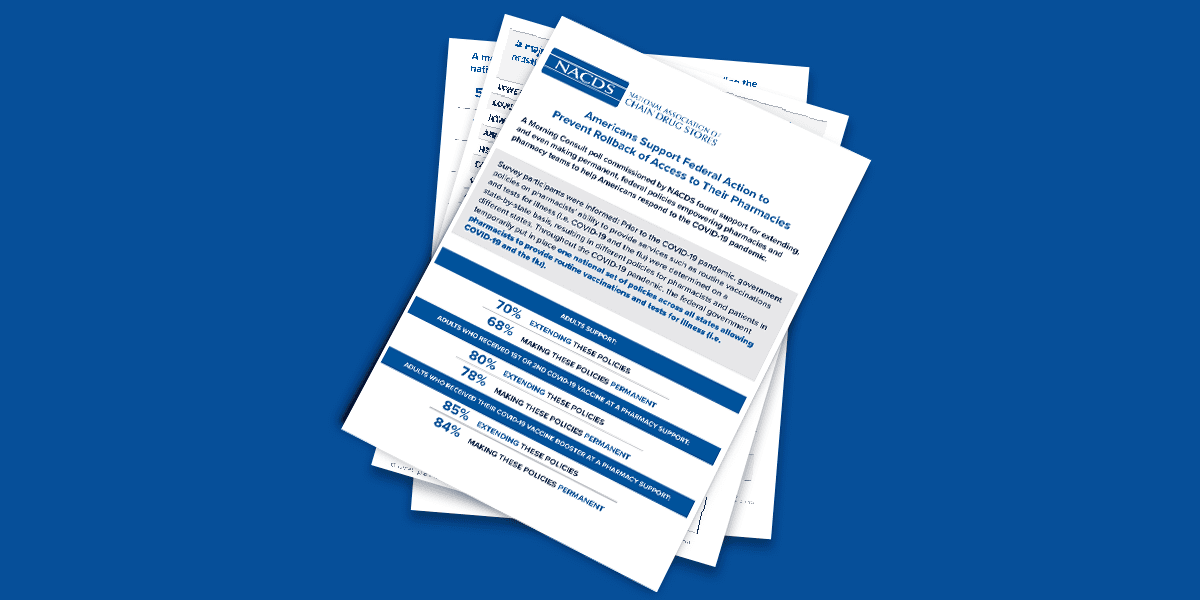Issue gaining attention on Capitol Hill and validation in renowned Centers for Disease Control and Prevention journal
NACDS today released poll results that show significant support for extending the policies that have allowed Americans to access essential services from their pharmacies during the pandemic.
NACDS has urged the Biden Administration to provide clarity or to take definitive action to ensure Americans maintain access to pharmacy services that will remain essential when the current public health emergency (PHE) concludes. These services – made possible under an array of amendments to the current declaration of the Public Readiness and Emergency Preparedness (PREP) Act – relate to COVID-19 tests, vaccinations and therapeutics; childhood vaccinations; and flu vaccinations.
The poll – conducted by Morning Consult and commissioned by NACDS – surveyed American adults from March 4 to 6. Regarding the set of national policies that were put into place to allow pharmacists and pharmacy teams to provide pandemic-related services:
- 70% support extending these policies
- 68% support making these policies permanent.
Those who received a COVID-19 vaccination from a pharmacy are even more supportive. Among those who received their COVID-19 booster at a pharmacy:
- 85% support extending these policies
- 84% support making these policies permanent.
NACDS says these results bolster the urgent need for attention and response to its February 25 letter to Secretary of Health and Human Services Xavier Becerra and White House COVID-19 Response Team Coordinator Jeffrey Zients. In that letter, NACDS urged clarity that PREP Act pharmacy authorities will not be impacted by a lifting of the PHE, or an extension of the PREP Act declaration based on the sustained credible risk of a PHE.
“The loss of pharmacy-related PREP Act declaration allowances would impede the equitable access to care that Americans have received from pharmacy during the pandemic,” wrote NACDS President and Chief Executive Officer Steven C. Anderson.
Anderson explained, “While optimism is mounting, and may be warranted, for a potential end of the currently declared public health emergency, it is important that the access to care Americans have come to rely on and expect at pharmacies is maintained. Pharmacies have demonstrated their importance as an access point, and remain vital to continue meeting Americans’ needs and protecting health and wellness, especially as the nation navigates the potential transition from pandemic to endemic. Importantly, long-term solutions are needed as lessons learned from this pandemic demand the nation establish flexible, scalable, and sustainable access to vaccinations, testing, and other pandemic-related care for Americans at pharmacies now and permanently for future public health crises.”
This issue also is gaining attention on Capitol Hill. At a March 2 hearing of the Oversight and Investigations Subcommittee of the U.S. House of Representatives Energy and Commerce Committee, Ranking Member Morgan Griffith (R-VA) said: “Emergency flexibilities implemented by federal and state government also helped increase patient access to healthcare – such as allowing pharmacists to deliver vaccines and allowing hospitals to compound medications that were in short supply. As we move forward, this Committee should examine which of these flexibilities should be available on a permanent basis.”
The Centers for Disease Control and Prevention’s Morbidity and Mortality Weekly Report published today, March 11, further validates the need to prevent patient-access rollbacks. It states: “Broad vaccine access should be maintained while critical outreach efforts continue to improve vaccine coverage among children aged 5-11 years, especially in SVI [high social vulnerability] areas.”
The authors also note: “The expansion of legal authorities for the COVID-19 emergency response to allow pharmacists to vaccinate children and adolescents aged 3-18 years helped increase available providers and vaccine access for children aged 5-11 years. Pharmacy providers were critical in addressing high initial demand for COVID-19 vaccine among this age group, including during evenings, weekends, and over holidays, when other providers might be less available.”
Among additional findings of the poll results that NACDS released today, majorities of adults say extending the policies would have a mostly positive effect on each of the following:
- lowering COVID-19 hospitalization rates
- lowering COVID-19 deaths
- lowering COVID-19 cases
- ability to find COVID-19 symptom care
- health equity
- convenience of routine vaccinations
- convenience of tests for illnesses
- quality of healthcare services available
- patient ability to catch up on missed vaccines due to the pandemic.
Majorities of adults also indicated they find concerning these potential negative outcomes of not extending the policies:
- limited access to vaccines for COVID-19 and the flu
- limited access to testing for COVID-19 and the flu
- slower rollout of potential future COVID-19 booster shots
- slower response time for future COVID-19 variants
- inconsistent policies for patients in different states
- inequity in access for patients in different states.
“Americans do not want to see a roll-back of the access to convenient, trusted and equitable pharmacy services,” Anderson said. “We urge action to ensure Americans can continue to rely on their pharmacies and pharmacy teams and so we as a nation can remain prepared for whatever lies ahead.”
NACDS emphasizes government statistics that demonstrate the importance of pharmacy’s role in the pandemic response. Pharmacies provide more than two of every three COVID-19 vaccine doses. More than 30% of children ages 5 to 11 who have received their COVID-19 vaccination have done so at a pharmacy. Half of pharmacy COVID-19 vaccination sites are located in areas with high social vulnerability, and 70% of pharmacy testing sites are in areas with moderate to severe social vulnerability. More than 40% of those vaccinated at pharmacies are from racial and ethnic minority groups.
More information – including detailed reports of lessons learned and recommendations from the pandemic – is available at NACDS.org/COVID-19.
